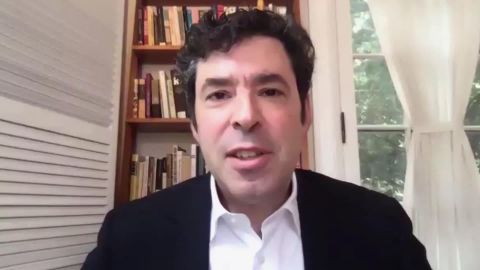Read Transcript EXPAND
CHRISTIANE AMANPOUR: Now, as we were discussing earlier, President Trump is sending federal forces into more American cities, something that our next guest is deeply concerned about. Jason Stanley is professor of philosophy at Yale University. And his book “How Fascism Works: The Politics of Us and Them” tells the story of the tropes that drive dictatorships. And here he is speaking to our Hari Sreenivasan about why he’s concerned about paving the road to authoritarianism.
HARI SREENIVASAN: Christiane, thanks. Jason Stanley, first, before we get into this conversation about fascism, how do you define it?
JASON STANLEY, AUTHOR, “HOW FASCISM WORKS”: Fascism is an ideology based on power, loyalty and fear of the other, where the other is defined ethnically or in terms of nationality or religion, and the leader represents us.
SREENIVASAN: Now, you wrote this book a couple of years ago, and, at the time, the reception to it was somewhat expected, a lot of people saying, you know what, this is too strong a word. He is taking some liberties here with how he defines it. It’s just an anti-Trump book, et cetera. Now you have got this out in paperback. You have written a little bit more about why you were scared and concerned then. What is it about the present moment that concerns you?
STANLEY: So, first of all, we have to bear in mind that you can have a fascist social and political movement in a democracy. And that’s what we’re seeing across the world right now, in Brazil and the United States. We’re seeing fascist social and political movements in democracies. And what you have to look for when that happens is the press to undermine the democracy from within, to undermine its institutions and to create new institutions, fascist institutions. Now, what are fascist institutions? The concentration camp is the classic example, a zone of lawlessness, as Alexandria Ocasio-Cortez drew our attention to the detention camps on the Southern borders a while ago as potential examples of this, and then a militia, a sort of militia that is the police, but not the police, that functions as a kind of weapon for national — ultra-nationalism, xenophobia, and in the service of the leader. And what concerns me now is that we have CBP and ICE on the streets of American cities, trained in an ideology of targeting non-citizens, now directed at cities controlled by the political opposition, which are represented as lawless and an out of order. And they seem to be fomenting, trying to foment violence and backlash in order to create this sense of a need for a powerful leader. And so that’s what concerns me now, is that we have something that might look like a militia, a national police force, whose job it is to do the president’s bidding. And that looks like an institution that doesn’t belong in a democracy.
SREENIVASAN: The acting secretary of DHS says, listen, DHS has been in the business of protecting structures, federal buildings 10 years ago, yesterday, today, and we will tomorrow. We don’t necessarily need the invitation of mayors and governors.
STANLEY: So, the literature on fascism warns us about institutions that are designed originally to protect us from foreign terrorists, that are involved in colonial wars, and then get directed domestically inside. The Department of Homeland Security was developed as a reaction to 9/11. It was the ideology about protecting us from domestic — from terrorists, from foreign terrorists. It’s an ideology directed toward towards colonial wars and protecting us from the backlash of colonial wars. When you start to see that kind of institution, which well proceeded Trump, as you pointed out, but is no part of our American history, before very recently, when you to see that institution being directed against domestic opponents, you have to become worried.
SREENIVASAN: Is there something different about the people that Border Patrol is used to dealing with vs. the people inside an American city?
STANLEY: What we have done is, we’re taking a group of agents who are trained to deal with non-citizens in objectifying and often horrific ways and directing them towards American citizens who are engaged in largely peaceful protests, exercising their democratic rights, and, frankly, as part of a political campaign. So, this is really reminiscent of bad, bad moments in history, where you have a force, a quasi-military force that has no obvious domestic role directed against citizens.
SREENIVASAN: There’s a college friend of mine who lives in the Portland area. And he has been so incensed by what he perceives to be the ineptitude of local government and state government that — I remember this phrase. He just said, when they go after the federal buildings, all bets are off. And, to me, what was interesting was that there’s a certain seduction to a strong sense of order. I mean, we see this happening around the world right now. It’s not limited to the United States. So, whether it’s — you want to look at Hungary or Brazil or India or the Philippines, there’s something in us that seems to want chaos reduced.
STANLEY: So, fascism is lawlessness in the name of law and order. Chaos has not been reduced in Brazil, India, and the United States. Chaos has been increased. What we have is lawlessness. What these forces are doing in particular in Portland is they’re actually – – they’re actually making the protesters more angry. They’re — I think they’re provoking them and creating larger demonstrations and protests. And they’re doing so intentionally, or, if they themselves don’t know it, it’s being — they’re being used intentionally to do that, because the president, as part of his political campaign, wants to create a sense of chaos for the cameras for television screens. So, what we have again and again in these regimes — and the Philippines is a great example — is lawlessness. When the police are shooting — shooting poor people on the street, that’s not law and order. That’s lawlessness. What we want is to treat people in accord with principles of justice and law and order. And what these leaders do is, they create chaos. They create chaos, and then promise you that they’re going to deal with the chaos that they create. But, in fact, the chaos is what they thrive on. And that’s what we’re seeing in Brazil, the United States, India, and the Philippines.
SREENIVASAN: In the context of what’s happening in Portland, you have got the mayor, you have got the governor, you have got mayors in lots of cities that are pushing back. Isn’t that a sign that our institutions are still strong enough to try and resist?
STANLEY: I don’t really like this talk of our institutions, as if our institutions are kind of like robots that walk around the country independently of us. No, we are our institutions. You, sir, are our press.
STANLEY: And I am our universities. And unless the universities stand up and say, no, we’re not institutions of left-wing ideology, we are — we don’t — unless our press stands up and say, no, you are lying, everything is going to fold. Our mayors are doing what our mayors should be doing, which is standing up against the federal government that is seeking to weaponize an institution, the Customs and Border Patrol, for an election. And the mayors are standing up for that. So, I prefer not to talk about institutions, but to talk about people.
SREENIVASAN: How much of this plays into propaganda, the repetition, the othering, the alienizing of people who don’t see the world the way you do?
STANLEY: Well, that’s at the very center of fascist ideology, the friend/enemy distinction. It’s why Trump and Bolsonaro and Modi have — and Putin have such great difficulties with reality, with COVID-19. It’s because they see everything in terms of a friend/enemy distinction. And the whole idea of this politics, which well proceeds Trump in the United States, is to say, my political opponent isn’t a legitimate opponent. My political opponent is a fundamental threat to the values you hold dear. And you might be an ordinary Christian conservative, an ordinary person who’s part of our democratic process, but these liberal elite — liberal elites, they threaten your way of life, and you need a strong man to protect you. And you show these terrifying moments of cosmopolitanism and leftists gone wild or whatever, and you represent that as a terrifying threat to people. And then you say, you need a strong man here. And this is a very familiar politics that does go back to the 1930s in Germany. You represent your enemy as a communist. I mean, good luck representing Joe Biden as a communist. But that’s what you do. And so you’re manufacturing dissent, because it’s that feeling that there’s no legitimate political opponent. Your political opponent is a traitor to the country and your fundamental values. And that’s why you need a tough guy to protect you.
SREENIVASAN: Should we be concerned about our lack of concern, or, I guess, maybe the normalizing of chaos?
STANLEY: Absolutely. These — this kind of regime style, this kind of leadership style thrives on chaos. And I think we can all agree we have seen a lot of chaos. We haven’t seen much order in the past three-and-a-half to four years. It’s a constant stream of people going in and out of the regime, a constant — the new cycle has been reduced to half-an-hour from a couple of days. A constant stream of people being replaced in the administration, so there’s no stability whatsoever, and everything is about scheming and plotting, and we’re grilled to our intelligence screens. And that’s how it works. It’s entertainment. It’s showmanship. It keeps you constantly in this fight-or-flight way, which feeds and give succor to leaders who represent themselves as war leaders, as, you know, there’s always an enemy. There’s always — I’m always protecting you. It’s always a — it’s always drama and chaos. And people get addicted to that. And what we need is, we need boring democratic government again.
SREENIVASAN: Does intent matter? I mean, are we ascribing too much genius to a five-dimensional chess player who’s crafting out this plot to have a fascist takeover of our institutions?
STANLEY: So, it turns out what really takes genius and strength is democracy, not fascism. How much genius and strength does it take to say, the immigrants are coming for your women, you have to protect your women? How much genius does it take to repeat these old tropes of American racism that black men on streets threaten your wives and daughters? That doesn’t take genius. That just takes repeating narratives that are deeply familiar. I think what takes genius and what takes strength of character and intelligence is saying, OK, I want this, you want something else, let’s compromise. That takes genius and strength of character. The analogy we need to draw and is repeatedly done in the literature on fascism from Hannah Arendt to the Frankfurt School, is between a mob boss and a fascist leader. Remember, fascism is about — about loyalty and power. So the mob boss repeatedly puts their family members, friends and business associates into positions of power, because any competent person is a threat to them. Reality is a threat to them. It’s all about loyalty. So, how much of an evil genius do you really need to be to be a mob boss?
SREENIVASAN: Do we know have a system of checks and balances? I mean, wasn’t that the beauty of the architecture of this democracy or this democratic experiment, that we have different divisions within how power is laid out in government? Can’t that stop it?
STANLEY: We have these institutions, but what happens is, they get hollowed out over time. It’s not like the institutions just exist independently from us. The institutions get hollowed out. You replace the heads of the institutions by loyalists, by friends, by business cronies. And then, over time, the institutions become shells of themselves. And then you create new institutions, which perhaps never should have been there in the first place, such as DHS and ICE, that play particular roles that you don’t want in a democracy.
SREENIVASAN: What’s to blame here? Is it the individual or all the systems that malfunctioned to get us to this point?
STANLEY: I place the blame on a faction of the Republican Party, perhaps spearheaded by Newt Gingrich in the ’90s, that said — that decided, as a political tactic, to declare the Democrats to be illegitimate. So, Hannah Arendt warns us of the danger of politicians who put loyalty to party over parties. And what she means is, we need to be aware of politicians who have more loyalty to their political party than a multiparty system. So, when you treat your political opponents as illegitimate, as really just anti-American, well, you’re paving the way for authoritarianism, whether it’s communist authoritarianism or fascist authoritarianism. And the Republican Party has — one faction of the Republican Party has long been doing that, has long been painting the Democrats as fundamentally illegitimate. And that’s anti-democratic. And it’s no wonder that you get a swaggering strongman who said, not only is there only one political party that’s legitimate; there’s only one leader of that political party who’s legitimate.
SREENIVASAN: But none of that, if it goes far back as Newt Gingrich, the things that broke the systems aren’t going to be fixed if Joe Biden wins.
STANLEY: They’re absolutely not going to be fixed. And that’s what the Black Lives Matter protests are about. We have discovered recently that we are putting an enormous amount of our money in city budgets into the police, rather than the problems that result in crime, poverty, lack of jobs. We’re putting an enormous amount of our federal budget into the military. We incarcerate a great — as large a percentage of our population as the Soviet Union did under Stalin in the early 1950s. We are the world’s leader, maybe history’s leader, in terms of incarcerating our population, especially our black population. Almost 10 percent of the world’s prison population comes from 40 million black Americans. So, we have this long history. We have failures of elites that lead to politicians rightly being able to say, look, the system is rigged, the system is broken. All those things, history teaches us, lead the way to regime collapse. So, we need to have a system that is more responsive to the people, that doesn’t treat segments of the population as subhuman, as less than, as less worthy. We need to get rid of the system of mass incarceration that can easily be extended to political opponents. All of these things are — and many more problems, the widening economic inequality that enables a leader to come and say, I represent the people against the elites. And until we do that, we’re always going to face this threat.
SREENIVASAN: Jason Stanley of Yale University. The book is called “How Fascism Works,” now available in paperback. Thanks so much for joining us.
STANLEY: Thank you so much, Hari.
About This Episode EXPAND
Christiane speaks with former diplomat Wendy Sherman about the global democratic order. She also speaks with Sweden’s chief epidemiologist about COVID-19 and Heidi Larson, director of the Vaccine Confidence Project, about how those who are anti-vaccine could impact the coronavirus battle. Hari Sreenivasan speaks with philosophy professor Jason Stanley about what fascist regimes have in common.
LEARN MORE



